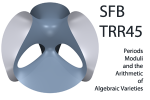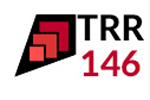Find here information about research collaborations at the Institute of Mathematics:
SFB TRR 45: Periods, moduli spaces and arithmetic of algebraic varieties
 The CRC 45 supports research in the intersection of arithmetic and algebraic geometry. This includes in particular periods and moduli spaces of algebraic and arithmetic varieties. Besides research, the support of young scientists via the Integrated Research Training Group is our principal goal.
The CRC 45 supports research in the intersection of arithmetic and algebraic geometry. This includes in particular periods and moduli spaces of algebraic and arithmetic varieties. Besides research, the support of young scientists via the Integrated Research Training Group is our principal goal.
SFB TRR 146: Multiscale Simulation Methods for Soft Matter Systems
 Multiscale modelling is a central topic in theoretical condensed matter physics, material science, and numerical mathematics. Within the collaborative research centre TRR 146 funded by DFG colleagues from numerical analysis collaborate with physicists and chemists to further develop efficient algorithms to simulate macroscopic properties of soft matter, which are determined by an intricate interplay of energy and entropy, and minute changes of molecular interactions.
Multiscale modelling is a central topic in theoretical condensed matter physics, material science, and numerical mathematics. Within the collaborative research centre TRR 146 funded by DFG colleagues from numerical analysis collaborate with physicists and chemists to further develop efficient algorithms to simulate macroscopic properties of soft matter, which are determined by an intricate interplay of energy and entropy, and minute changes of molecular interactions.
SFB TRR 165: Waves to Weather
 The collaborative research center TRR 165 funded by DFG addresses the great challenge of identifying the limits of weather predictability in different situations. Jointly with colleagues from the Institute of Atmospheric Physics at this department and from the universities of Munich (LMU) and Karlsruhe (KIT) mathematicians focus on the analysis of small-scale cloud models and on the impact of structured heat sources on macroscopic atmospheric flows.
The collaborative research center TRR 165 funded by DFG addresses the great challenge of identifying the limits of weather predictability in different situations. Jointly with colleagues from the Institute of Atmospheric Physics at this department and from the universities of Munich (LMU) and Karlsruhe (KIT) mathematicians focus on the analysis of small-scale cloud models and on the impact of structured heat sources on macroscopic atmospheric flows.
Computational Science Mainz

The "Center for Computational Sciences" is an institution of the Johannes Gutenberg University, funded by the state Rhineland-Palatinate. The aim of this research focus is to foster research projects that link information technology and mathematics on the one hand and physics, chemistry, geosciences and biology on the other. The subjects being investigated derive from nuclear and particle physics, the theory of condensed matter, genome research, meteorology and geodynamics, among others.
Cluster of Excellence PRISMA

PRISMA is one of two excellence clusters in Germany dedicated to research into basic questions about the nature of the fundamental building blocks of matter and their importance for the physics of the Universe. The Cluster is funded by the German Research Foundation (DFG) and the State of Rhineland Palatinate. Contributions from Mathematics include the adaptation of latest algorithmic developments of numerical linear algebra to so-called QCD (quantum chromodynamics) omputations as well as the application of methods of algebraic geometry and number theory in the computation of Feynman amplitudes for quantum field theory or for the study of various aspects of string theory.
Max Planck Graduate Center
 The MPGC is a virtual department across two Max Planck Institutes and four faculties of the Johannes Gutenberg University in Mainz, created for interdisciplinary projects. We offer an advanced PhD program in several research topics to excellent candidates from all over the world. The Graduate Center has its own doctoral degree regulations, promoting interdisciplinary research, and awards the young scientists after a successful defense with the degree "Doktor rerum naturalium" (Dr. rer. nat.) of the University of Mainz complemented by the logo of the Max Planck Society.
The MPGC is a virtual department across two Max Planck Institutes and four faculties of the Johannes Gutenberg University in Mainz, created for interdisciplinary projects. We offer an advanced PhD program in several research topics to excellent candidates from all over the world. The Graduate Center has its own doctoral degree regulations, promoting interdisciplinary research, and awards the young scientists after a successful defense with the degree "Doktor rerum naturalium" (Dr. rer. nat.) of the University of Mainz complemented by the logo of the Max Planck Society.